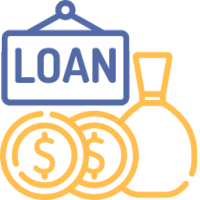Borrow Money Online Instantly With Bad Credit
Easy Process. No Paperwork. Get Funded In One Business Day
Apply Online Now
Why ASAP Finance?
We’re an innovative platform designed to help people get money asap.
We apply strong requirements when picking lenders and building a network.
Once a borrower submits a loan request form, we do our best to find the lender with the best possible loan terms.
We review customers’ data and analyze it.
Our Products
If you need to borrow money online instantly, ASAP Finance is here to offer you cash advances up to $5,000 with a money deposit within a business day. Get quick cash till payday with no credit check and instant decision. And yes, we accept bad credit too! Get started today.
We want to meet each of our customer's needs. Whether you're looking for a payday loan, personal loan, or other bad credit loans, we have a cash advance that suits your current situation.
- Guaranteed Payday Loans
- Fast Cash Loans
- Emergency Cash Advances
- Same-Day Loans Online
- Tribal Online Loans
- Emergency Loans With No Job
- Installment Loans
- Personal Loans for Bad Credit
How Does It Work?
Nothing can be easier than borrowing money online. Follow these simple steps to apply and get a cash loan today.
Step 1
Fill out and submit our online loan request form. It usually takes less than 5 minutes to complete.
Step 2
Get an instant loan decision from one of our reputable lenders by email. If approved, read and electronically sign a loan agreement.
Step 3
Get a loan amount in your bank account within an hour, by the end of the same day, or as soon as the next business day.
Representative Example
Loan amount $300 for 14 days with a $45 to $90 lender fee. Your representative APR is 391% to 782%
Calculation: (lender fee / loan amount) x (number of days in a year / loan term) x 100
Low End of Range: ($45 / $300) * (365 days / 14 days) x 100 = 391.07%
High End of Range: ($90 / $300) * (365 days / 14 days) x 100 = 782.14%
Total loan cost: from $345 to $390.
How Do Loan Repayments Work?
Your monthly repayments will be collected from your checking account on the due date, which is usually your paycheck date. Depending on the type of loan you take out, it may happen once per month in equal monthly principal-plus-interest payments or in one lump sum from your next payday.
Borrow Money Online Instantly With ASAP Finance
We know how challenging it can be to borrow money online with a poor credit history. That's why we are here to lend you a helping hand when no one else does. We strongly believe your credit score doesn't define who you are. ASAP Finance always does its best to help borrowers with different credit histories get the assistance they need right away.

We work with multiple lenders that offer loan options on any occasion. All of them are trusted, reputable, and licensed, so working with us is always safe. Whether you want to get a personal loan or think payday loans suit you more, there will be no criminal or prohibited actions against you.
Our service is 100% free. You don't need to pay any additional charges or hidden fees to borrow money online. We work with direct lenders only, so applying with us can also help you save money.
If you need to borrow money immediately, there are many online loans we can offer you at fair interest rates. Choose the option that suits your needs and apply in just 5 minutes by completing our online application form. Applying with us, you can get from $100 to $5,000 within a business day via direct deposit to your active checking account.
ASAP Finance is all about helping people reach their financial goals in a simple and stressless way. Unlike traditional financial institutions, such as banks and credit unions, our online lenders don't perform hard credit checks through major credit bureaus. Thus, you can borrow money online and keep your credit score unchanged.
The Best Way to Borrow Money With Bad Credit
ASAP Finance is an online short-term loan company created to help you borrow money online by matching you with the right direct lender. We offer a full range of small personal loans for bad credit history to help you cover any emergency expenses or daily needs. Our online loans are affordable to almost everyone and are available even with a poor credit score.
Unlike any secured loan, such as title loans or home equity loans from a bank or credit union, our short-term loans from payday lenders don't require any collateral. They also don't have any restrictions on what you can spend the money for. Whether you need to cover your credit card debt, medical expenses, utilities, or pay for repair works, bad credit loans are one of the best ways of getting money fast and without issues.
How to Apply for Loans Online for Bad Credit Instant Decision?
If you need to borrow money online, a small personal loan is one of the fastest and easiest ways. The application process is very simple and doesn't require much of your time. Here are the basic application steps:
Prepare your personal and account details
You may need to specify your Social Security Number, ID, employment status, and personal and contact information, including the address, as well as provide the lender with bank statements or any other income proof.
Complete an application form
Enter all the required details and submit the application to let us share it with our base of trusted lenders.
Wait for a response
Get an instant loan decision within 15 minutes via email.
Read and sign a loan contract
Make sure everything is clear for you, or contact the lender to specify the details. If the conditions are good for you, sign a loan agreement.
Get the funds
The loan amount will be funded to your bank account via direct deposit, usually within 24 hours.
Why Borrow Money Today With ASAP Finance?
ASAP Finance does its best to become the first company that comes to your mind when you need urgent cash. We appreciate your trust and always live up to our clients high expectations by providing fair and accessible loans with our customers in mind. Applying with us, you will get:
Qualified assistance.
Our friendly staff is united by not only the common goal of helping people overcome their financial difficulties. We are a team of professionals who know everything about the lending market and are always here to share this knowledge with you;
24/7 online application.
You don't need to waste your time gathering documents or changing your plans trying to reach the store before closing. Apply online at any convenient moment from your home or workplace;
Flexible payment plan.
Choose the option with a payment schedule that is convenient to you. You can repay your loan in fixed monthly payments or in one large sum, depending on the loan option you consider;
Fair interest rates.
Our lenders are very interested in helping you. That's why they always monitor the market to make sure they can offer you loan options at competitive rates.
Instant decision.
As the application process is simplified, and lenders don't waste time on hard credit checks, they typically email you a loan offer shortly after you apply. In most cases, applicants get loan decisions in less than 15 minutes.
Huge base of reputable lenders.
We work with licensed lenders only and make sure our clients are satisfied with the experience they have with us. We have plenty of offers and are ready to help you find the right one.
No hidden fees.
Applying with us is 100% free. You don't have to pay anything except for a lender fee.
Where Can I Borrow Money Now Near Me?

Don't waste your time visiting a store! Apply online on our website wherever you are and get the money fast. If you still want to apply in person or have some questions to discuss with a branch manager, use our locator to find the store near you. We are always happy to help you in any convenient way.
Frequently Asked Questions
01
How to Borrow Money Online?
Whether you consider payday loans or personal loans, the process of borrowing money online starts with a loan application. You need to fill out and submit a loan request form to give payday lenders access to your application details. Once an online lender that meets your requirements makes a soft credit check and approves your application, you will get a loan offer by email. Thus, all you need to borrow money instantly is your PC with internet access and a couple of minutes of your spare time.
02
I Need Money Now - Can ASAP Finance Help?
Sure, we can! We understand how hard it may be to borrow money fast, especially with a bad credit rating. Thus, one of our main priorities is to provide borrowers with instant, affordable, and accessible financial assistance. If you need to borrow money now, you're welcome to apply and get an instant decision. Once approved, you will get a direct loan money deposit to your active bank account within a business day.
03
How Much Can I Borrow With ASAP Finance?
Depending on the loan type you choose, the state you apply in, and your income, you can borrow from $100 to $5,000 with loan repayments either in equal monthly installments or in one large payment by your next payday. In most cases, your credit rating doesn't affect the amount you can borrow.
04
How Fast Can I Get Emergency Cash?
Typically, you will get access to your installment loan or a payday cash advance as soon as the next business day. There is also an option for those who need to get small loans faster. Apply for a loan early in the morning on a weekday if you need to borrow cash by the end of the same day.
05
Can I Borrow Money Instantly With Bad Credit?
Yes, you can. Most lenders usually verify applicants loan requests within no more than 15 minutes and strive to transfer the money at railway speed. They also don't pay much attention to your credit score and are more focused on your stable income to make sure the amount you want to borrow suits your budget. Thus, your poor credit score is not the reason for being rejected.
06
What Are Requirements for Borrowing Money Online?
Eligibility criteria for installment loans or payday loans are generally very easy-to-meet. It requires you to be an adult resident of the US, have a permanent address, live checking account, valid cell phone number and e-mail, stable income, and provide the lender with your personal details by filling out an online application. In most cases, lenders don't have minimum credit score requirements and don't make loan decisions relying on your credit record information. However, requirements may vary from state to state or from lender to lender.
07
Should I Pay Any Fees If I Borrow Money Online With ASAP Finance?
Getting money with us is 100% free. There is no loan origination fee or hidden payments. You only have to repay the initial loan amount plus interest rates and fees, which are set by your direct lender.
08
Does Applying Through Short Term Loan Companies Affect My Credit Score?
No, it's not. Our online lenders commonly don't check your credit report details through main credit reporting bureaus. They check loan requests through alternative sources of information, so you may not worry about lowering your credit score.
Apply now and borrow money with no credit check!You are one step away from guaranteed loan approvalApply Online NowI read and agree to Terms, Rates, Privacy Policy before submitting a loan request.